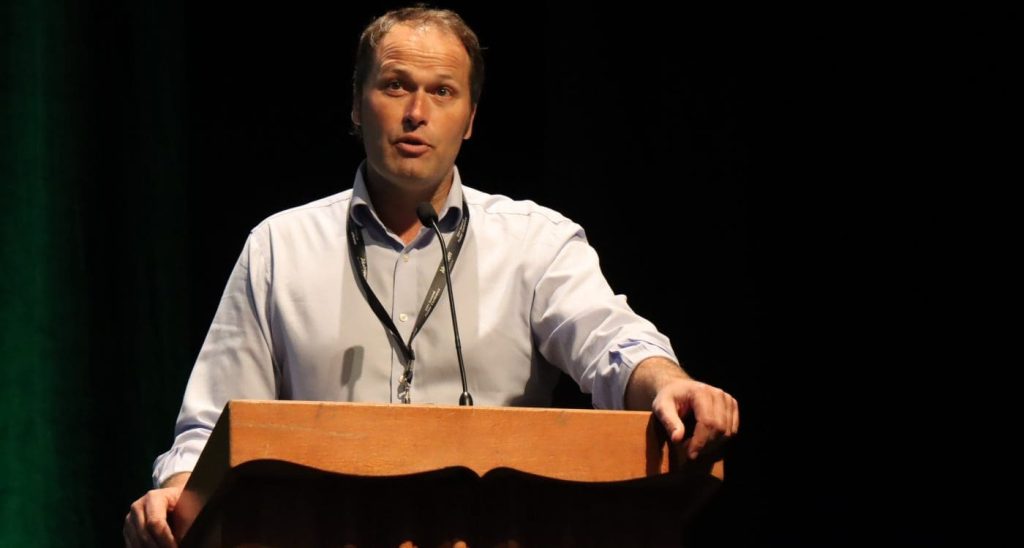
NFF president David Jochinke: government must call time on biosecurity protection levy.
AUSTRALIA’S national farmer body has called on the Albanese Government to give up on further taxing farmers with a biosecurity protection levy, as Nationals leader David Littleproud reiterated his opposition.
National Farmers Federation president David Jochinke said Labor’s proposed biosecurity tax on farmers was straight up bad policy.
“It wasn’t just farmers saying that, but a stack of experts outside agriculture as well.
“It’s incredibly frustrating the Government is content keeping farmers in a holding pattern,” he said.
“They must call time on the tax, go back to the drawing board and do the policy the due diligence they skipped when they flung it out in a rush.”
Mr Jochinke said the NFF is very open to conversations about sensible opportunities to improve biosecurity outcomes.
“We’re particularly keen to understand what trade impediments exist to implementing a container levy.”
Mr Littleproud today warned that Labor still has no plan for biosecurity on National Biosecurity Week that runs from 26-30 August.
He said National Biosecurity Week is a timely reminder that Labor needs to explain how it will fund, support and safeguard Australia from dangerous pests and diseases.
“Labor seems to have ditched plans for a fresh food tax, or biosecurity protection levy, which was due to be implemented on July 1,” Mr Littleproud said.
“Labor’s fresh food tax would have hurt families at the checkout as well as 84 agricultural commodities, which faced taxes to raise $150 million over three years, to pay for the risks created by their competitors, which is those importing from overseas.
“The biosecurity protection levy will not get the support it needs in the Senate, ensuring Labor’s senseless and terrible tax idea doesn’t come to fruition, after an enormous campaign by The Nationals in conjunction with industry and farmers to stop its reckless fresh food tax,” he said.
“However, July 1 has come and gone and Labor hasn’t announced a new plan to fund biosecurity.
“Labor must explain if taxpayers will now foot the biosecurity bill,” Mr Littleproud said.
Minister for Agriculture Fisheries and Forestry Julie Collins did not respond to Sheep Central’s questions, but the Department of Agriculture Fisheries and Forestry said the government is considering all options to the Biosecurity Protection Levy, and continues to consult with the sector.
In an ABC interview earlier this month, Ms Collins was asked if the biosecurity protection levy was “still on the cards”, she said:
“I’ll be having more conversations with people about it.
“As I said, we have, as taxpayers, invested significantly more the billion dollars over four years,” she said.
“It is a system that people rely on and people get benefit from, and we need to make sure that those people that use it and get benefit from it contribute to it.”
A Department of Agriculture Fisheries and Forestry spokesperson said the government has introduced a sustainable funding model that maximises available funding for biosecurity to protect and grow Australian agriculture, fisheries and forestry industries.
“This is the first time Australia has had sustainable and predictable funding for biosecurity.
The spokesperson said the model, as announced in Budget 2023-24, includes more than $1 billion over four years, and $267 million annually from 2027-28.
“This is locked in and provides long term funding certainty.”
The DAFF spokesperson said in addition to more money for biosecurity through increased funding from government, the Budget also delivered structural reform to biosecurity funding, including returning importers to full cost recovery.
“In 2023, the department reviewed biosecurity cost recovery arrangements for the first time since 2015 – and subsequently increased fees and charges for importers by 28 per cent on average, the department said. The contribution of importers will be almost $100 million more in 2024- 25 compared to 2021-22.
“The department said it has also committed to an annual review of regulatory charges and made changes to legislation to include indexation to ensure that cost recovery keeps pace with the cost of delivering services; there are no plans to change this.”
DAFF said the Commonwealth biosecurity budget in 2024-25 is about $841 million; $424 million from government appropriation and $417 million from cost recovery.

Biosecurity at borders is the Commonwealth’s responsibility. So, taxpayers should bear the cost. If there is to be a levy, it should paid by importers, who will be the likely source of incursions. Making farmers pay is akin to charging victims for the crime committed against them.